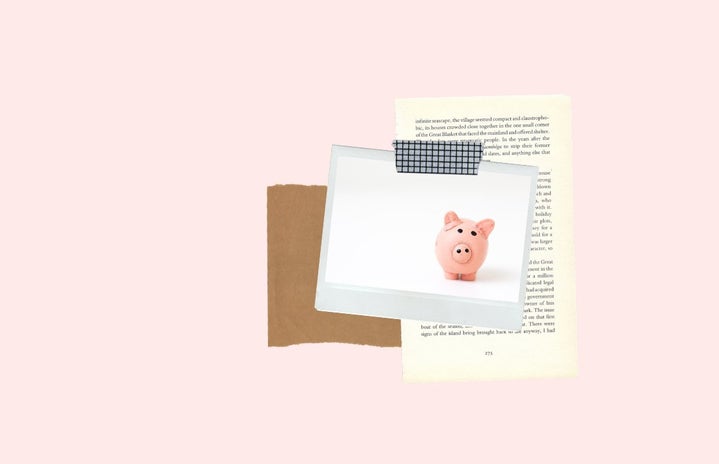I love to talk about money and there are so many reasons you should join the conversation. Talking about money — and not treating it as a taboo subject — means that you can be candid with your friends about why you really aren’t feeling drinks today.
You’ll be less likely to make impulse buys when you’re broke (because you’re acknowledging it), and talking about money at work leads to income equality. So, yeah, I’m big on talking about money. It helps me to keep a level head, track my spending, and keep track of what I’m actually spending my money on. Here are a few tips on how to talk and think about money to get you ready for 2020!
- Question curb impulse buys
-
This is the first significant step you can take towards having meaningful control over your finances. There’s a real scientific reason as to why you feel a rush whenever you impulsively reward yourself through shopping. Every time you reward yourself, your brain releases a rush of dopamine that conditions you to seek out that feeling again. So, find a new way to reward yourself! You can take a stroll, get some fresh air, sunbathe, go for a swim, cook a delicious meal, craft something, anything you want. Just do all of these things with the mindset that you’re rewarding yourself to recondition your brain.
Whenever I get the scratch to buy something, I ask myself three questions: Will I use this item in the long term? Would I receive this as a gift and be thrilled? Would I actually be sad if someone else buys it right now? If the answer to any of these questions is no, I leave it and walk away.
Related: “Retail Therapy” Is Not the Answer — How to Be Smart With Your Money and *Still* Treat Yourself
- Track your spending
-
Tracking your expenses isn’t as hard as it seems. All you need is a spreadsheet, a phone, or your credit card app. If you mostly pay for things with a credit or debit card, I recommend Mint. I prefer the spreadsheet method, but I’ve heard only good things about spending trackers. All you do is log in with your bank info and link your debit and credit cards. Then Mint generates statistics to let you know what your spending habits are. What’s really great is that Mint includes transactions made with all the cards you choose to include, while your bank app will just show you the cards you have with that one bank.
Then there’s my preferred method: the spreadsheet. Spreadsheets totally remind me of my parents poring over their finances and logging in the info, but even though it may make you feel older than you are, it really works. I made my own spreadsheet expense tracker, but there are plenty of templates to choose from. A spreadsheet gives you the benefit of focusing on specific areas instead of the whole picture and it lets you track the spending you do with cash, as long as you remember to log it.
- Find a budgeting method that works for you
-
My time-tested method of budgeting is the classic envelope. Whenever I know I need to save money for a specific thing, like my tuition, I’ll slowly put away small increments inside an envelope. I usually write the amount I need to save on one corner and the amount I put in each time in the other. I also set a weekly reminder to put away x amount of money. There are plenty of other ways to budget; do some exploring to find out what’s right for you. It may take some trial and error, but this is one of the best lessons to learn.
- Keep track of your subscriptions
-
In the growing age of online subscriptions, it can be easy to forget how many services you’re really using. Even something as little as $5 a month can stack up. If you have five subscriptions at $5 a month, that’s $300 a year. But don’t worry, there are plenty of apps that do the heavy lifting of keeping track of your subscriptions for you, such as Truebill, Trim, SubscriptMe, and Trackmysubs.
Just remember that subscriptions include everything from Spotify to that monthly care package you receive!
- Make sure you’re maximizing your credit card potentials
-
I pay for everything with my credit card, which allows me to maximize the rewards I can get. I currently have the Bank of America Student Cashback Rewards Card — it has zero annual fees, no interest rate for the first year, and cashback benefits. It allows me to build up my credit without having to worry about paying to use it. Plus, the cashback rewards allow me to pay for parts of my bill which is like a bonus every month.
Some credit cards have loads of benefits that you’re not even aware of. For example, the Costco Anywhere Visa® Card by Citi has no foreign transaction fees, travel rewards, emergency assistance, access to presales, extended manufacturer warranty, and roadside assistance. In today’s day and age, it’s super important to find the right credit card for you.
One final thing: never spend more than what you can afford with a credit card.
- Think realistically about your credit card spending
-
A lot of people can easily get roped up in the freedom that having a credit card gives you. You swiped at the supermarket, gas station, local café, and your account balance doesn’t go down. It can be easy to overspend and land in debt. Credit card debt is one of the most stressful situations you can land in. there are low minimum payments but high interest rates which means you’ll be paying them off for a long time if you can’t afford to pay off lump sums.
However, there are effective ways to minimize the potential of debt. For one, if you’re spend-happy, you can start by lowering your credit line. Call up your credit card and ask to lower the amount of credit extended to you. You can ask for an amount that’s just what you need: that way, you won’t be tempted to spend. You can also just pay off your card every time you buy something. It can seem taxing to have to pay every single time, but if your card has an app, it’s just as easy as logging in, paying and closing the app! That way, you’ll see your balance go down. Remember, be consistent with how you manage your spending or you won’t make responsible habits.
- Invest in quality items if you can
-
If you have the ability to actually invest in clothing, shoes, kitchenware, accessories, bags (and more!) that are durable and long-lasting, do so. Start thinking about the things you buy through a pay-per-wear perspective. When you think about material objects in terms of how much use you’ll get out of them, it’s easier to actually realize whether it’s worthwhile to get them or not.
Let’s say you want a pair of combat boots. Doc Martens cost upwards of a $100 but you can get a fast-fashion pair for $40. There’s a $60 difference here in terms of price but not in use. Doc Martens last a lifetime if taken care of correctly while the cheaper boots will break down faster, likely only lasting a season or two. You’ll end up paying more in the long-run because you’ll have to replace them every few years.
- Unsubscribe from all those pesky promo emails
-
Unless you’re specifically waiting for a company to send you a code or sale so you can buy a specific item, there’s no point in being constantly bombarded by promo emails. I use Unroll.me in order to mass unsubscribe from promos. This service is free and has a fantastic feature: it allows you to lump the promo emails that you do want to keep into one email. The less promos you see, the less likely you’ll spend on what you don’t need.
Related: How to Be the Super Woman of Your Finances & Your Life, According to Nicole Lapin
- And finally, prioritize
-
One of the most constructive and difficult steps in taking care of your finances is to accept what you should be prioritizing on. Credit card bills should always be paid first because of the high-interest rates. Never take a cash advance from a credit card either; the interest rate is far too high. Then focus on immediate bills like light, water, and your rent. Finally, pay off long term commitments like student loans. If you’re in an incredible amount of debt, talk to a financial advisor before doing anything drastic. However, always call companies you owe money to and try your best to negotiate. They’re often eager to set up flexible payment plans instead of having to send your information off to collection companies or have someone default on their payment.
These are all methods that work for me and the degree of privilege that I have. I recommend that you talk to a financial advisor so you can figure out what works for you. The first step is to realize that conversations about money are very important. They help you get an outside perspective which, in turn, allows you to find out how you’re doing in relation to everyone else. Have realistic expectations about yourself and your spending.
Here’s to a successful 2020!


